69,000 housing units in Gaza destroyed, Hamas-run government media office says
Thousands of residential and civilian buildings have been totally or partially destroyed by Israel’s land, sea and air campaign on the strip, the Hamas-run government media office said in a statement today, as it released statistics showing the scale of destruction on the Gaza Strip.
Sixty-five thousand tons of explosives have been dropped on Gaza, it said in a statement on Telegram, totally destroying 69,000 residential buildings and partially destroying 290,000 more.
Ninety-four schools and universities, 130 mosques and three churches have also been destroyed, the media office said. Hundreds of hospitals have been taken out of service, either due to destruction or lack of equipment and fuel, it added. Mosques, churches and educational facilities, alongside hospitals, are being widely used by internally displaced Gazans as sheltering zones, given their classification as protected civilian objects under international humanitarian law.
More than 22,000 people have been killed in the Gaza Strip so far. In a statement Friday, the U.N.’s undersecretary general for humanitarian affairs, Martin Griffiths, said the enclave had “simply become uninhabitable,” due to the scale of destruction and inability of humanitarian agencies to effectively distribute aid or supplies.
Cumbersome process and ‘arbitrary’ Israeli inspections slow aid delivery into Gaza, U.S. senators say
CAIRO — At Egypt’s Rafah border crossing, lines of hundreds of trucks carrying aid wait for weeks to enter Gaza, and a warehouse is full of goods rejected by Israeli inspectors, everything from water testing equipment to medical kits for delivering babies, two U.S. senators said Saturday after a visit to the border.
Sens. Chris Van Hollen and Jeff Merkley pointed to a cumbersome process that is slowing relief to the Palestinian population in the besieged territory — largely due to Israeli inspections of aid cargos, with seemingly arbitrary rejections of vital humanitarian equipment. The system to ensure that aid deliveries within Gaza don’t get hit by Israeli forces is “totally broken,” they said.
“What struck me yesterday was the miles of backed-up trucks. We couldn’t count, but there were hundreds,” Merkley said in a briefing with Van Hollen to a group of reporters in Cairo.
The U.S. has been pressing Israel for weeks to let greater amounts of food, water, fuel, medicine and other supplies into Gaza, and the U.N. Security Council passed a resolution on Dec. 22 calling for an immediate increase in deliveries. Three weeks ago, Israel opened its Kerem Shalom crossing into Gaza, adding a second entry point for aid after Rafah.
Still, the rate of trucks entering has not risen significantly. This week, an average of around 120 trucks a day entered through Rafah and Kerem Shalom, according to U.N. figures, far below the 500 trucks of goods going in daily before the war and far below what aid groups say is needed.
Other than the trickle of aid through the crossings, Israel has barred the entry of supplies since its assault on Gaza began three months ago, aiming to destroy Hamas after its Oct. 7 attack on Israel.
The result has been a humanitarian catastrophe for the territory’s 2.3 million Palestinians.
Almost the entire population depends on the trucks coming across the border for their survival. One in four Palestinians in Gaza is starving, and the rest face crisis levels of hunger, according to the U.N. More than 85% of Gaza’s people have been driven from their homes by Israeli bombardment and ground offensives. Most live in U.N. shelters crowded many times beyond their capacity, in tent camps that have sprung up or on the streets. The few functioning hospitals are overwhelmed with wounded and patients amid outbreaks of disease, as sanitation systems have collapsed.
Van Hollen and Merkley said a more simplified process for getting aid into Gaza is necessary. During a three-day visit to Egypt, they met with Egyptian officials, U.N. aid agencies and non-governmental relief groups working in Gaza. At Rafah on Friday, they also spoke to doctors who had come out of Gaza and a truck driver waiting to get in.
Trucks carrying aid cargos can wait for weeks at the border for their turn to be processed, they said they were told by aid officials. They enter the Egyptian side of the border, drive along no-man’s land to the Israeli facility at Nitzana for inspection by the military, then return to Rafah to cross into Gaza — or go to Kerem Shalom for inspection and entry there.
Kerem Shalom operates eight hours a day, and both it and Nitzana close part of Friday and all Saturday. “This, in a 24-hour-a day” humanitarian crisis, Van Hollen said.
Israel says the inspections are necessary to prevent items of military use from reaching Hamas.
During the process, cargos are unloaded and reloaded several times. If inspectors reject a single item in a truck, it must return with its entire cargo to be re-packaged, starting the weeks-long process all over again, said Van Hollen, a Democrat from Maryland.
The reasons for rejection are often “very vague, and they are conveyed informally. Sometimes they were very unreasonable,” said Merkley, a Democrat from Oregon.
The two senators said they saw a warehouse in Rafah filled with material that had been rejected in inspection. It included oxygen cylinders, gas-powered generators, tents and medical kits used in delivering babies.
Aid workers told the senators the tents were refused because they included metal poles, and the medical kits because they included scalpels. Most solar-powered equipment appears to be barred — though it is vital in Gaza, where central electricity has collapsed and fuel for generators is in short supply.
“The warehouse was a testament to the arbitrariness” of the process, Van Hollen said.
There is a process for pre-approving cargos, but it can take weeks, they said, and even items that obtained prior approval are sometimes rejected during inspection. After inspection, trucks are considered “sanitized” and their drivers are not allowed to interact with anyone; the senators said they were told one truck driver was turned back after someone brought him a cup of coffee, violating the rule.
The process is “completely incompatible” with a humanitarian crisis of this extent, Merkley said. “There has to be a simplified process” that honors Israel’s concerns over potential military uses of goods but also addresses the scale of the situation, he said.
The senators, who both sit on the Senate Foreign Affairs Committee, said they were drawing up recommendations for changes.
Speaking to reporters in Jerusalem this week, Col. Elad Goren, a senior official in the Israeli military body overseeing Palestinian civilian affairs known as COGAT, admitted that Israeli security checks could be hampering rapid aid delivery but largely blamed the bottlenecks on international agencies and the United Nations.
Asked about certain forms of medical equipment not being allowed in, he said, “I want to make it clear we are not refusing anything that is underneath four headlines … Food, water, medical supplies and shelters.”
Goren said the U.N. should increase manpower and workers’ hours and deploy more trucks to deliver aid. He maintained the humanitarian situation in Gaza was under control and there was sufficient food. Officials at COGAT did not respond to Associated Press requests for comment on the senators’ briefing.
Van Hollen and Merkley said U.N. and other aid workers described extensive problems in distributing aid. They must ration the small amount of fuel Israel allows to enter Gaza between hospitals, bakeries and aid trucks. Frequent collapses of the communications system — or simple inability to recharge phone batteries — makes contact and coordination with aid teams impossible.
Arranging safe passage for aid deliveries is an enormous challenge, they said. “Nothing about deconfliction is working,” Merkley said. Aid groups inform the Israeli military of their movements but even once they have assurances an area is safe, it sometimes gets struck.
“No place really becomes deconflicted,” Merkley said. “It is not safe for them to move.”
Commander of Hamas’ Nuseirat Battalion killed in airstrike, IDF says
The commander of Hamas’ Nuseirat Battalion, Ismail Siraj, and his deputy, Ahmed Wehbe, were killed in an airstrike led by Israel’s southern command Friday, the Israel Defense Forces and Israeli Security Agency said in a joint statement.
The Nuseirat Battalion was instrumental in Hamas’ attack on Israel on Oct. 7, including attacks on the Be’eri kibbutz, the statement said.
Prior to his role with the Nuseirat Battalion, Siraj worked as a company commander of Hamas’ Nukhba Unit and as a rocket manufacturing operative, the IDF and ISA statement said.
Wehbe assumed the role of his deputy after the previous deputy was killed in IDF and ISA strikes in the first weeks of the war, according to the statement.
Hamas did not immediately issue a statement confirming the deaths.
Netanyahu: ‘The war must not be stopped until we achieve all of the goals’
Israeli Prime Minister Benjamin Netanyahu said in a statement tonight that the war in Gaza will not end until Israel achieves “all of the goals” it has set out.
“Three months ago Hamas committed a terrible massacre against us,” the statement read. “My government directed the IDF to go to war to eliminate Hamas, return our hostages and ensure that Gaza will never again be a threat to Israel.”
He said the country “will not give Hamas any immunity whatsoever,” adding that the fight will continue until security is reached in all parts of Israel.
“Until then, and to that end, everything must be put aside and we must continue with united forces until absolute victory is achieved,” Netanyahu said.
Blinken has landed in Amman, Jordan
Pentagon waited three days to inform White House that the defense secretary was hospitalized in ICU
WASHINGTON — Amid tensions in the Middle East, Secretary of Defense Lloyd Austin was hospitalized, including spending four days in the intensive care unit, according to two senior administration officials.
The Pentagon did not inform senior officials in the White House’s National Security Council of Austin’s hospitalization until Thursday — three days after he arrived at Walter Reed Medical Center, a U.S. official confirms. Politico first reported the delay.
Austin was not able to perform his duties since New Year’s Day, a senior defense official said Friday. Pentagon press secretary Maj. Gen. Pat Ryder told NBC News that Austin “resumed his full duties” on Friday evening. He remained hospitalized on Saturday.
Details about what ailed him were unavailable. He remained hospitalized Friday evening, and it was unclear when he would be released, the source said.
Austin was admitted to Walter Reed National Military Medical Center on Monday night for “complications following a recent elective medical procedure,” Ryder said in a statement Friday evening.
UNICEF: 600,000 doses of vaccines delivered to Gaza as deadly diseases spike
UNICEF delivered over 600,000 doses of vaccines against diseases like measles, pneumonia and polio to the Gaza Strip last month to help protect the more than 16,500 children who have missed their routine jabs, it said.
“Overcrowding, harsh weather, the near-collapse of the health system, limited access to clean water and sanitation, along with increased vulnerabilities, such as injuries and weakened immunity, create a fertile ground for vaccine-preventable diseases to thrive,” UNICEF said in a news release Friday.
The vaccines were delivered from Dec. 25 to Dec. 29, it said, adding that the agency is working with the U.N. Relief and Works Agency for Palestine Refugees in the Near East, the World Health Organization and local groups in Gaza to secure more doses.
1.4 million people are sheltering at UNRWA facilities, agency says
More than 1.4 million of the 2 million people displaced in Gaza are sheltering in United Nations facilities, the U.N.’s agency for Palestinian refugees said.
Hundreds of thousands more people have spilled over into areas near its shelters, which are beyond capacity, said the U.N. Relief and Works Agency for Palestine Refugees in the Near East.
Of the UNRWA’s 155 shelters, 131 have been damaged in the war, it said. So far, 319 people have been killed while sheltering, and “1,135 injured in direct hits or collateral damage.”
UNRWA shelters include camps, homes and schools.
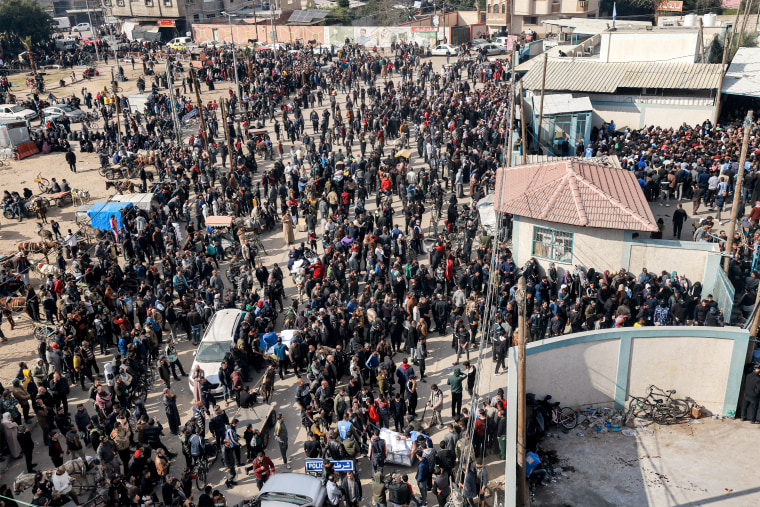
U.S. Navy shoots down drone from Yemen in the Red Sea
A U.S. Navy destroyer ship in the Red Sea shot down an unmanned drone launched from a Houthi-controlled area of Yemen on Saturday, U.S. Central Command saidon X.
The USS Laboon was near multiple commercial vessels in international waters, but no casualties were reported, Central Command said.
The incident follows a series of attacks by Iranian-backed Houthi rebels on shipping in the Red Sea, which prompted a White House meeting on Wednesday to discuss a possible strike against Houthi targets.
Hezbollah claims it has killed or wounded 2,000 Israelis on Lebanon border
The Lebanese militant group Hezbollah claimed Saturday that it has killed or wounded 2,000 Israelis in military operations against the Israeli army on the southern Lebanon border.
The 670 targeted attacks took place from Oct. 8 to Friday, Hezbollah said in a statement. NBC News has not independently verified the claims.
Hezbollah said it had made a direct hit Saturday on a gathering of Israeli soldiers in Avivim, a settlement in northern Israel less than a mile from the Lebanese border.
Hezbollah has targeted vehicles, command centers, settlements, a military factory and technical equipment over 89 days on the southern border with Israel, it said.
More than 76,000 people in Lebanon displaced by border fighting
Confrontations between Israel and Hezbollah have displaced thousands of people, according to daily population monitoring conducted by the U.N.’s International Organization for Migration.
More than 76,000 people had been internally displaced in the country between Oct. 8 and Jan. 2, the organization said Thursday. In December, the Lebanese Health Ministry said nearly 100 people had been killed by the fighting.
A total of 60,000 people have also been evacuated from towns in southern Israel and in the area bordering the Gaza Strip, according to Israeli media.
E.U. foreign policy chief: ‘Nobody will win from regional conflict’
European Union foreign policy chief Josep Borrell sounded the alarm on Saturday about Lebanon being dragged into a regional conflict in a spillover from Israel’s war with Hamas.
Borrell, speaking during a visit to Lebanon, said it was imperative to avoid a regional escalation in the Middle East, and warned Israel that “nobody will win from a regional conflict.”
He was commenting at a news conference with Lebanese Prime Minister Najib Mikati following talks with top government officials to discuss events in and around Gaza, including the impact of the war and the situation at the Israeli-Lebanese border.
Blinken and Erdoğan discuss containing Gaza war, two-state solution
Secretary of State Antony Blinken and Turkish President Recep Tayyip Erdoğan discussed the need to contain the conflict in Gaza and how to work toward “lasting regional peace” during a meeting in Istanbul today, according to a statement by State Department spokesperson Matthew Miller.
Blinken emphasized the need to “prevent the conflict from spreading, secure the release of hostages, expand humanitarian assistance and reduce civilian casualties,” Miller said.
They also discussed the need for peace that accounted for Israel’s security while advancing the “establishment of a Palestinian state.”
Turkey, a NATO member, is a key U.S. ally for both the Middle East and Russia.
IDF strikes sites in southern Lebanon
The IDF retaliated against a “barrage” of missiles sent into northern Israel by the Lebanese militant group Hezbollah today by striking a series of targets in southern Lebanon using fighter jets and ground soldiers.
The IDF and Israeli Air Force said it had struck against “terror targets” in Ayta ash Shab, Yaroun and Ramyeh, near Lebanon’s southern border with Israel.
NBC News was unable to independently verify this report.
Fears of an escalating conflict between Hezbollah and Israel have been heightened in recent days, following the assassination of Hamas’ deputy political leader Saleh al-Arouri in Beirut on Tuesday.
Palestine Red Crescent reports ‘intense shelling’ near Al Amal hospital
Heavy artillery shelling is targeting the vicinity of Al Amal hospital in Khan Younis in southern Gaza, the Palestine Red Crescent Society, whose headquarters is in the hospital, said.
Shrapnel from the shelling was scattering onto the building and was accompanied by heavy gunfire from drones.
The PRCS said that one displaced person living in the hospital was shot in the chest by a sniper and injured.
NBC News has not been able to independently verify these reports.
Far-right finance minister criticises Israeli defense minister’s plan for the ‘day after’
Israel’s far-right finance minister, Bezalel Smotrich, has criticized plans outlined by Defense Minister Yoav Gallant for the “day after” the end of Israel’s war in Gaza, describing them as a “rerun” of “the day before” Oct. 7.
“The solution in Gaza requires thinking outside the box and changing the concept by encouraging voluntary immigration and full security control, including renewal of settlement,” Smotrich said on Facebook yesterday, reiterating rising rhetoric by Israel’s right to force Palestinians from Gaza into the Sinai desert or neighboring Arab countries.
Gallant’s plan calls for Israel’s continued military control of Gaza, with Palestinians in charge of civil affairs. The U.S., Egypt, and other Arab countries would lead rehabilitation efforts, and there would be no settlement expansion.
Smotrich, who is the leader of the nationalist party Religious Zionism, is a key figure in Benjamin Netanyahu’s increasingly embattled ruling coalition government. He has repeatedly denied the existence of a Palestinian people and has advocated for the creation of “sterile security areas” around illegal Israeli settlements in the occupied West Bank, further encroaching onto Palestinian land.
Blinken meets with Erdoğan, foreign minister in Istanbul
Secretary of State Antony Blinken met with Turkish President Recep Tayyip Erdoğan and Foreign Minister Hakan Fidan in Istanbul today, on his first day of a weeklong Middle East tour.
There was no press coverage of the meeting, in which Blinken and Erdoğan were set to discuss Turkey’s potential role in the reconstruction of Gaza, the escalation of the conflict, and the sale of American F-16 jets to Turkey.
In a meeting with Fidan, Blinken discussed “the war and humanitarian crisis in Gaza, Sweden’s NATO accession process, bilateral & regional issues,” according to a post on X from Turkey’s Ministry of Foreign Affairs.
Hamas says it is open to initiatives to ‘stop the aggression against our people’
A spokesperson for Hamas discussed what it believes to be the U.S. role in the war, as Secretary of State Antony Blinken touched down for a weeklong tour of the Middle East.
“We call on the American administration to admit its mistake and reevaluate its position, which caused major crimes to be committed in Gaza,” senior spokesperson Dr. Sami Abu Zuhri said during an interview with Al Jazeera, and posted on Hamas’ Telegram channel.
Abu Zuhri described the U.S. as “a partner in the aggression against Gaza,” and called for the U.S. to “work to achieve a ceasefire”
Saying that the group was open to “all initiatives,” Zuhri said Hamas was seeking to “stop the aggression against our people” but reiterated the position that there could be no new hostage exchange before a permanent cease-fire.
Food costs in Gaza soar, despite global price decline
Famine is “around the corner” in Gaza despite a global drop in food prices, the United Nations said today.
People in Gaza are facing “the highest levels of food insecurity ever recorded” said the U.N.’s emergency relief coordinator, describing the humanitarian relief mission as “impossible” amid communications blackouts, damage to roads and infrastructure, and as humanitarian staff are “killed or displaced” and “convoys are shot at.”
“Commercial supplies vital to survival are almost non-existent,” the U.N. said.
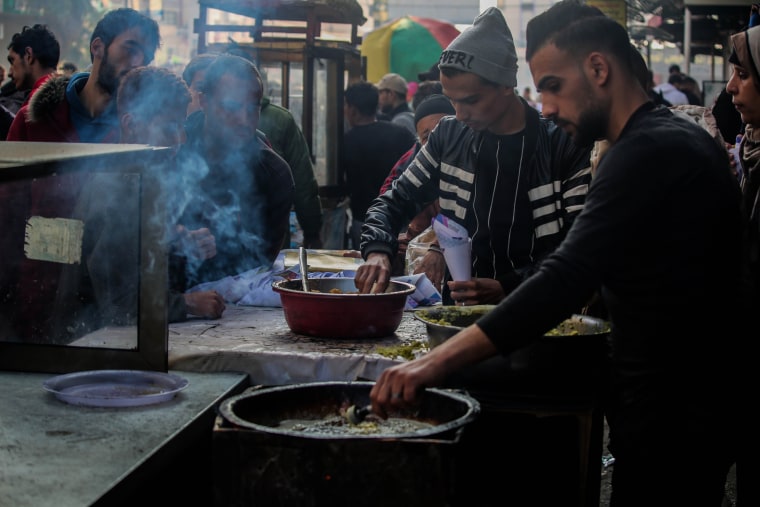
Last month, the U.N. reported a “catastrophic” situation in Gaza, where 90% of people face “acute food insecurity.”
Photos: Aftermath of a strike in Khan Younis today
Mourners and the dead are pictured at the morgue of a hospital in the southern city of Khan Younis today. Israel has said that it will focus its new war plan in Gaza’s south, where the vast majority of displaced Gazans have gone for refuge.
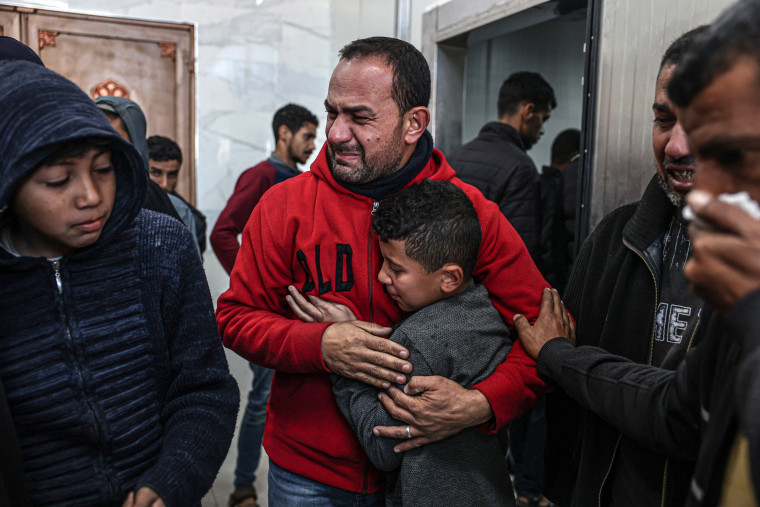
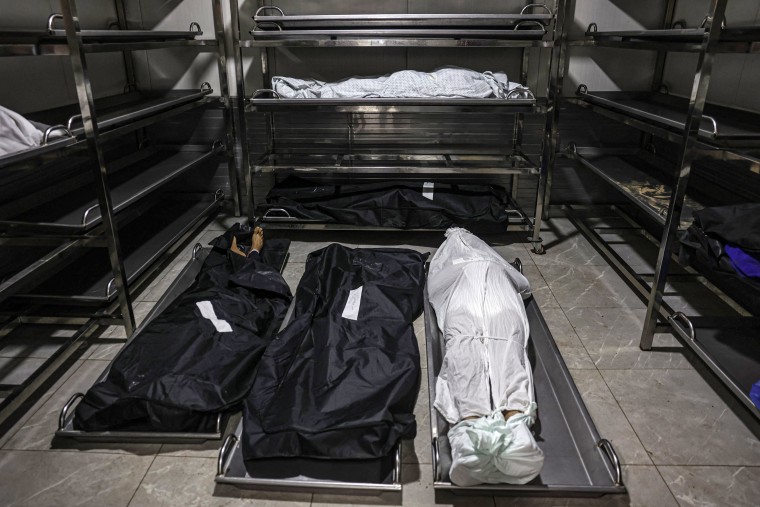
Israel commits to a yearslong assassination campaign against Hamas leaders and militants
A drone strike in Beirut that killed senior Hamas official Saleh al-Arouri could be the opening shot of a yearslong, worldwide campaign to hunt down Hamas leaders responsible for the Oct. 7 attack on Israel.
While Israel has not yet officially claimed responsibility for the assassination, four sources told NBC News it was behind the strike.
In a public remarks, the head of Mossad, Israel’s intelligence agency, said: “Every Arab mother should know that if her son participated directly or indirectly in the massacre of Oct. 7, he will bear responsibility.”
Israeli officials told NBC News that the country’s intelligence agencies have formed a joint mission called “Nili” — meaning “the God of Israel is steadfast” — to hunt down Hamas operatives working across the region, including in Lebanon, Turkey, Qatar and Gaza.
The IDF says it has killed or captured over 9,000 Hamas militants, one-third of its fighting force. But it has come no closer to reaching Yahya Sinwar, Hamas’ leader, who is believed to remain in Gaza alongside top lieutenants.
Hezbollah sends barrage of rockets into northern Israel in retaliation for Beirut strike
The Lebanese militant group Hezbollah claimed to have targeted a number of sites in northern Israel this morning, as a “preliminary response” to the assassination of Hamas senior leader Saleh al-Arouri in Beirut on Tuesday.
The group used “62 missiles of various types” to target a military base on Mount Meron, claiming to have achieved “direct hits.”
In separate attacks, the group also claimed to have fired rockets at the northern border town of Metula, and to have targeted Israeli soldiers at the northern Hunin barracks.
Israel said that 40 launches toward Meron had been detected following sirens sounding across the north. It struck a “terrorist cell” it said had taken part in the launches in response, according to an IDF statement.
U.S. bases struck with drones in Iraq, Islamic Resistance says
Militants in the Islamic Resistance of Iraq attacked two U.S. bases in Syria today, the group said in a statement.
The group said it targeted Al-Tanf Base in western Syria and Al-Shaddadi in the northeast using drones in response to “American occupation forces in Iraq and the region,” as well as in response to Israel’s war in Gaza.
The attacks come as Secretary of State Antony Blinken begins a fourth Middle East tour in Turkey.
Gaza’s child amputees face further risks without expert care
KHAN YOUNIS, Gaza — Eleven-year-old Noor’s left leg was almost entirely torn off when her home in Jabalia, Gaza was hit by an explosion in October. Now her right leg, fitted with a heavy metal bar and four screws drilled into the bone, may have to be amputated.
“It hurts me a lot … I’m afraid that they’ll have to cut off my other leg,” she said from her hospital bed, staring at her clunky fixation device.
“I used to run and play, I was so happy with my life, but now when I lost my leg, my life became ugly and I got sad. I hope I can get an artificial limb.”
In bombed-out Gaza, a generation of child amputees is emerging as Israel’s retaliatory blitz after Hamas’ deadly Oct. 7 attacks has led to blast and crush injuries as explosive weapons tear through densely-packed high-rise housing blocks.
Poor hygiene and medicine shortages spell more complications and amputations on existing injuries, some of which may not be survivable, doctors say.
“Many limbs that apparently had been saved, will go on to require amputation. And many (people with) amputations and limbs that we think have been saved may still go on to die of the longer term consequences,” said Dr. Chris Hook, a British emergency medicine doctor with medical charity MSF who returned from Gaza in late December.
Staff at the European Hospital in Gaza where Noor is being treated, which is running at triple capacity, cannot provide the new limb she dreams of. Even painkillers to help amputees with chronic pain are running low, staff say. Flies were buzzing around the ward when a Reuters journalist visited.
In some cases, as with 10-year-old Gaza orphan Ritash, her right leg had to be re-amputated higher up and just below the knee after it became infected, according to a U.N. humanitarian office (OCHA) aid worker Gemma Connell who met her.
“I think what I have seen would break anyone’s heart,” said Connell
Gaza has become ‘uninhabitable,’ U.N. humanitarian chief says
The United Nations humanitarian chief says Gaza has become “uninhabitable” three months after Hamas’ horrific attacks against Israel and “a public health disaster is unfolding.”
Martin Griffiths said in a statement Friday that “people are facing the highest levels of food insecurity ever recorded (and) famine is around the corner.”
And Gazans are “witnessing daily threats to their very existence — while the world watches on,” he said.
The U.N. undersecretary-general for humanitarian affairs said tens of thousands of people, mostly women and children, have been killed or injured, families are sleeping in the open as temperatures plummet, and areas where Palestinians were told to relocate have been bombed.
The few partially functioning hospitals are overwhelmed and critically short of supplies, infectious diseases are spreading, and amidst the chaos some 180 Palestinian women are giving birth every day, he said.
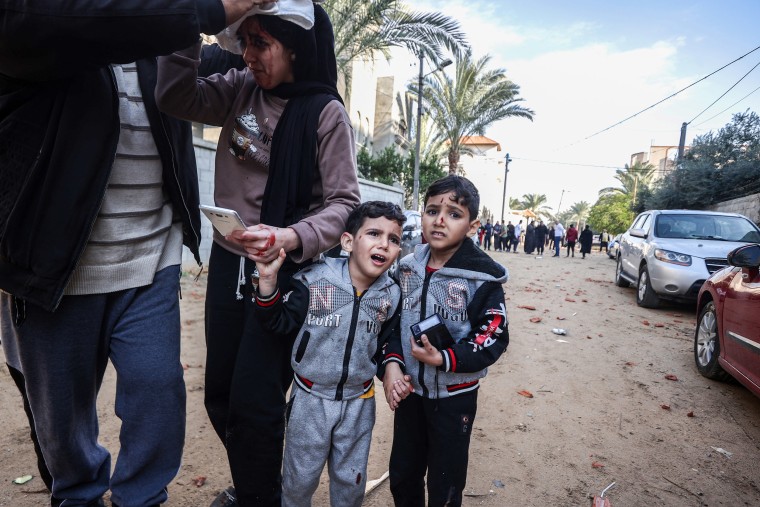
Griffiths reiterated U.N. demands for an immediate end to the war and the release of all hostages, declaring, “It is time for the international community to use all its influence to make this happen.”
He said the humanitarian community is facing an “impossible mission” of supporting more than 2 million people in Gaza while aid workers are killed, communications blackouts continue, roads are damaged, truck convoys are shot at, and vital commercial supplies “are almost non-existent.”
Gaza has shown “the worst of humanity,” Griffiths said, and it’s long past time for the war to end.








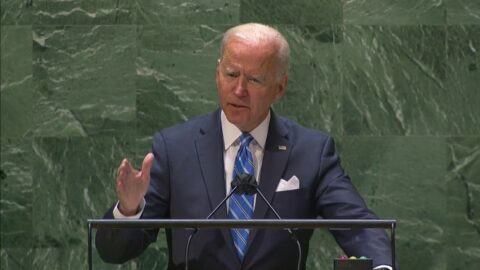

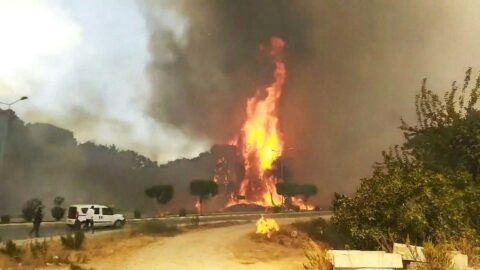

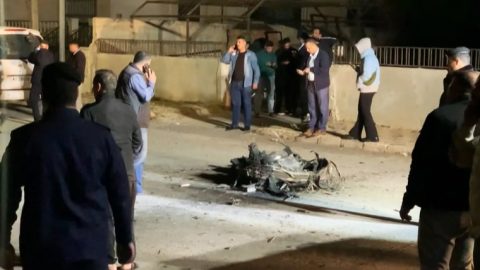
Recent Comments